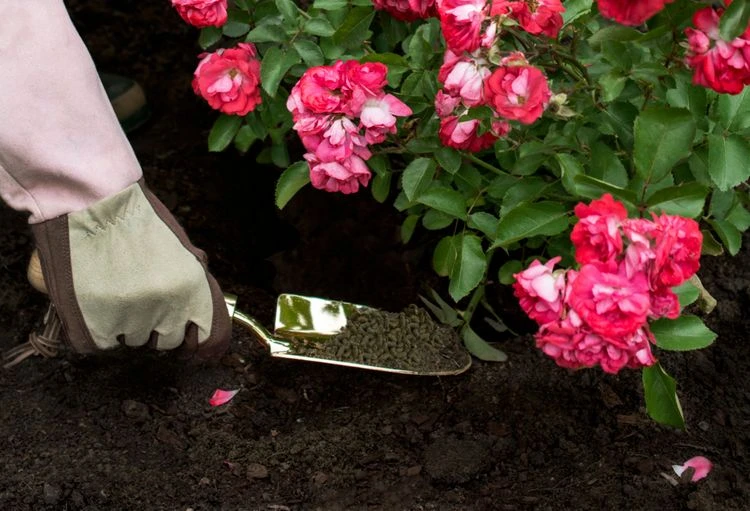Fertilize roses in July? If you know why and what to feed your plants in the summer, you will be rewarded with a garden full of beautiful, fragrant blooms!
Roses are generally hardy plants that can thrive with minimal care from their owner. However, these plants need to be fertilized more frequently than other flowering shrubs if you want them to develop and bloom at their best. Luckily, it’s easy to give roses what they need, whether you choose organic or synthetic fertilizer. For best results, consistently use a good quality rose fertilizer that contains the ideal nutrient ratio.
The last rose fertilization is in July: why is it so important?
The last time before winter you should fertilize your roses in July. This gives the branches time to fully develop. In the absence of rainfall, the plant should be heavily watered to facilitate dissolution and root uptake. A small amount of organic fertilizer should be worked into the soil. Maintaining a healthy soil is also crucial. Therefore, regularly loosen the soil with a rose fork or a hoe and remove weeds or competing plants from around your rose bushes. Be careful not to damage the roots.
Fertilize roses in July with natural substances – mulch as a rose fertilizer
With the help of various organic fertilizers, roses can thrive and produce an abundance of beautiful blooms. The easiest way to keep the soil healthy and nourishing it naturally is to apply mulch around the base of the rose. Mulching a rose bed has more to do with nutrient supply to the soil than with the plant itself, and the result is healthy and disease-resistant roses. To strengthen the soil’s structure and nourish the ecosystem, use materials such as fallen leaves, well-rotted horse manure, worm castings, grass clippings and compost.
Fertilizer for roses – horse manure
Well-rotted horse manure is great for soil enrichment as it is full of vital nutrients like phosphorus, nitrogen and potassium, which are essential for vigorous rose growth. Water-soluble components such as potassium are gradually added to the soil by the slow decomposition and release of manure nutrients, rather than being washed away with the first heavy rain like chemical fertilizers.
Horse manure on the compost heap
Despite the lingering smell, the manure can be added to a compost heap. Adding manure to your compost pile speeds up the decomposition process due to the energy and bacteria contained in the manure. Adding brown material (such as dried leaves, cardboard, or shredded paper) to the compost pile can quickly stop the spread of the foul smell of manure.
Horse manure can be harmful to plant roots if applied too early, so it is recommended to wait for it to rot first.
Roses fertilize with worm humus in July
Your roses will thrive with the addition of worm castings to the soil as it is a digested, highly concentrated nutrient bundle that is easier for the roots to absorb.
horn shavings, blood meal and bone meal
Hornspäne are made from horns and hooves of animals. The finer the horn is ground (shavings, semolina or flour), the faster the fertilizer reacts in the soil.
The phosphorus in bone meal benefits the soil. If you want to prevent animals from being attracted by the smell and digging up your garden, mix it deep into the soil so it can’t be washed away by rain. A hefty tablespoon should be used per rose plant. Bone meal is released gradually throughout the growing season, so it’s best to apply in spring and then again in summer to encourage root growth and flowering the following year.
Another high-quality source of nitrogen is dried nitrogen Blutmehl. Scatter about a tablespoon around each plant. Avoid excessive amounts of nitrogen as this can cause root damage.
Use fertilizer pellets made from sheep’s wool
Sheep’s wool can be used as a long-lasting organic fertilizer in the garden. The sheep’s wool is spread immediately around established plants, then weighted down with soil and thoroughly soaked. Sheep’s wool pellets are much easier to spread.
Nettle manure as rose fertilizer
With a simple process and some finely chopped nettles and water, you can make your own nettle manure in a matter of weeks. It is easy and cheap to make and a lot of nettles can be removed. A disadvantage is that the nettle manure has to be stirred daily. This liquid fertilizer is rich in nitrogen and other trace elements such as calcium. The manure is used as a liquid fertilizer by diluting it 1:20 to 1:50 with water before applying it to the plants.
Roses fertilize with coffee grounds in July
Rose bushes can benefit from an extra dose of nitrogen if sprinkled with coffee grounds in July.
